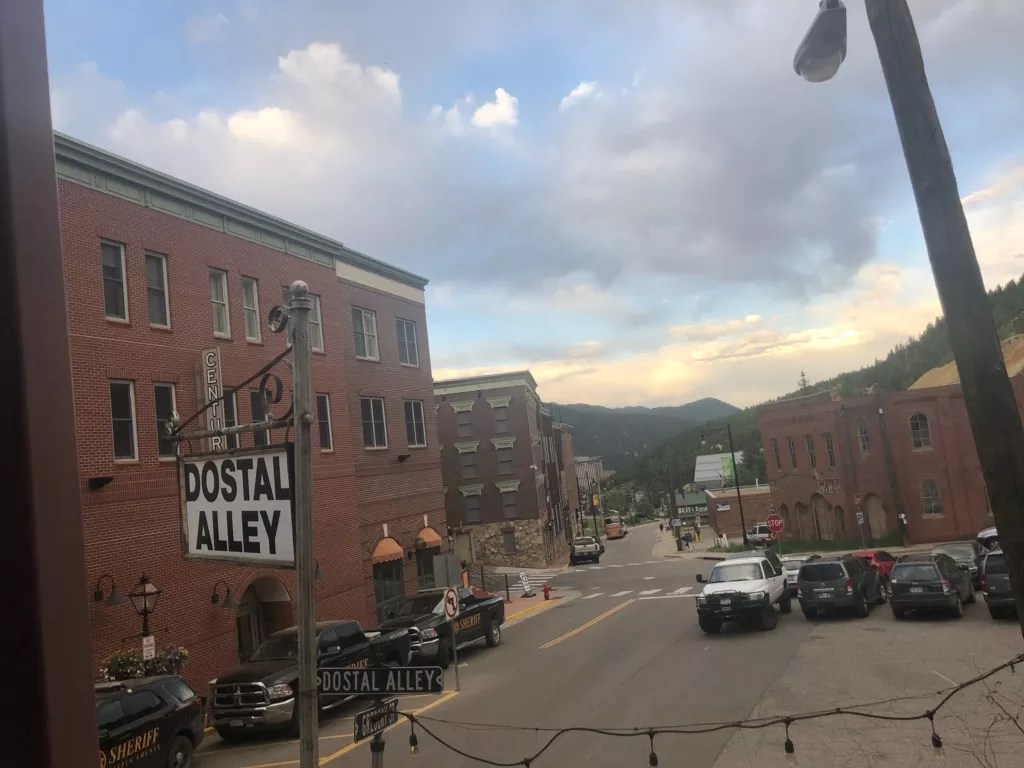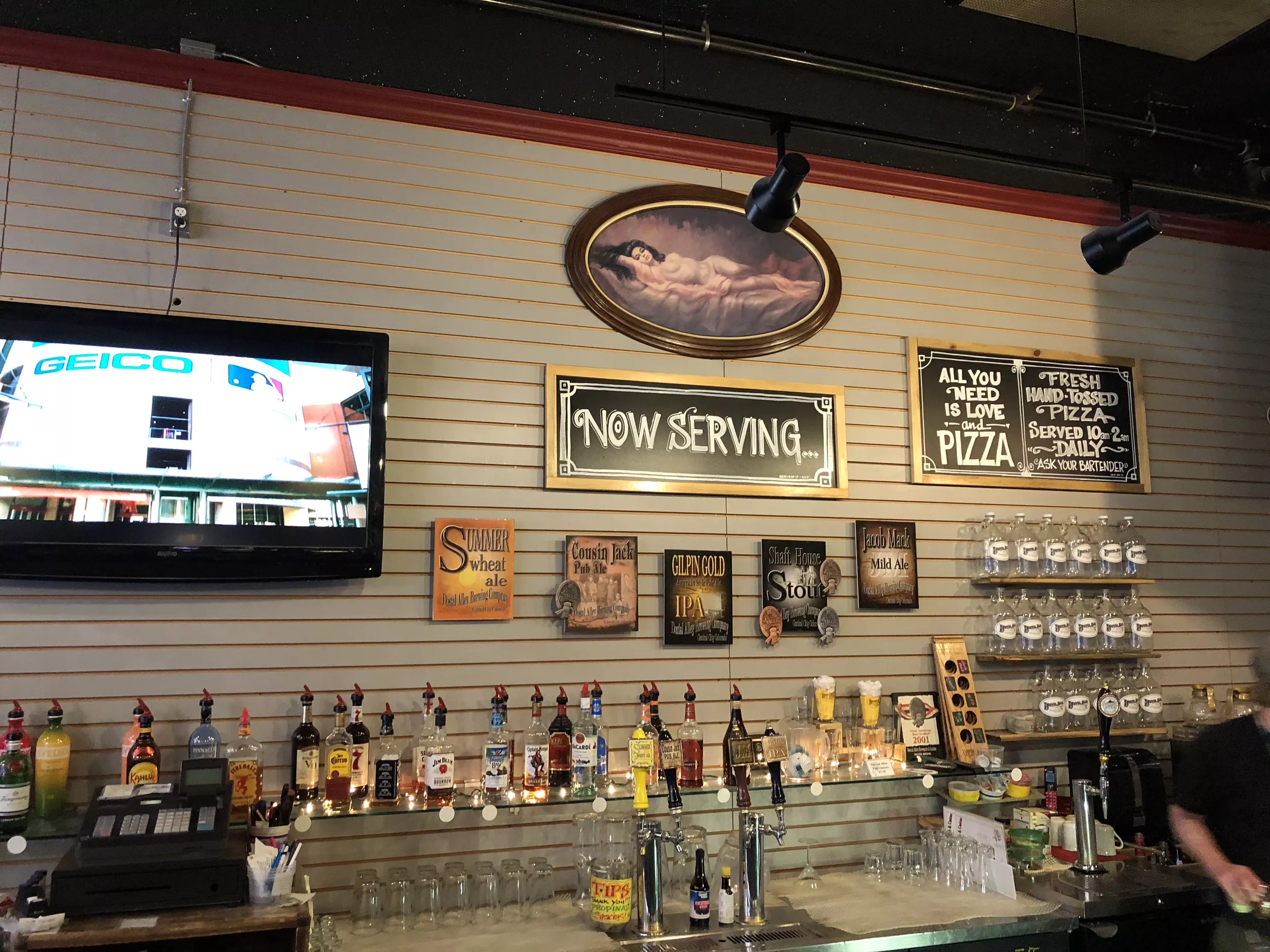
Samantha Morse

Audio By Carbonatix
Back in Colorado’s frontier days, there was a street called Dostal Alley in Central City – but not anymore, after much of the mountain town’s downtown area burned down in 1874. The only reminder of the long-gone street is Dostal Alley Casino & Brew Pub, and an original street sign at the edge of what is now a parking lot for the bar.

Another beautiful afternoon in Central City, just on the edge of what was once Dostal Alley. The original sign hangs beneath a newer, larger sign.
Samantha Morse
When some friends and I pulled into Central City on a recent weekend trip, we received a real history lesson – along with a side of house-brewed beer. After trying my hand at some slot machines in the larger Century Casino up the street, we retreated to the smaller Dostal Alley casino and bar, which serves as the main watering hole for locals in the tiny historic town. A friend of mine lives in Central City and told me that Dostal Alley is the only true neighborhood bar in town. When I mentioned her name at the bar, true to small-town form, the bartender knew exactly who I was talking about.
The guy who really hooked us up with the history and stories was Warren Tucker, who refers to himself as the “animal in the cage,” a longtime employee who mostly works in the downstairs portion of the bar in the “cage,” or cashier’s window. The place is three stories tall, with a ground-floor bar and a bank of slot machines, plus a seating area and kitchen serving up pizza and calzones to go with your beers. On the second floor, there’s an area that’s used as a rental hall. On the main level, the floor plan is split, with a copper bar embedded with Keno screens and an area behind a half-wall packed with old-school slot machines.
Dostal Alley opened in 1991, as part of the first wave of Central City casinos after gambling was legalized, and has kept much of the vibe the same since then. Tucker tells us that the casino here is the only place in town that still has nothing but coin-operated slot machines. I have to say, the ka-ching sound of coins pouring out of a slot machine is pretty amazing, and a long-lost experience in most places. But it makes a lot of work for the cashiers, Tucker adds.

Only in Central City do neighborhood bars come with classic slot machines.
Sarah McGill
As my friends and I hung out at the bar on the main floor, tasting and settling on a couple different beers from the Dostal Alley brewery, we also heard about the namesakes and stories behind the beers. Brewers Dave Thomas and Buddy Schmalz, who have been brewing creative beers here since 1997, have won several Great American Beer Fest awards for their Cousin Jack Pub Ale and Shaft House Stout. The Pub Ale is called Cousin Jack because in the historic mining days of Central City, many of the mine workers were from Cornwall, England, and had the habit of calling every man Jack as a greeting. It was basically the nineteenth-century equivalent of calling someone “dude” or “bro.”
Several other beers pay tribute to local history as well. The 1874 Smoked Porter was named for the aforementioned 1874 fire in Central City, while the Jacob Mack is a mild ale named for a brewer and farmer from the 1800s. Tucker points out that the ruins of Mack’s farm can be seen up the hill on the outskirts of Central City, now part of Prospector’s Run, a modern condo and apartment complex. I’ve noticed these partial stone walls, because they appear anachronistic next to a modern bus stop at the mouth of a neighborhood of newer buildings. The Jacob Mack beer is actually made from local Central City hops; residents of the town bring in garbage bags full of hops that grow on their properties (probably one of the most Colorado things I’ve ever heard about). Those Central City hops, which may or may not have been picked by the regular customer sitting just down the bar, tasted delicious.
The Dostal Alley building was purportedly a brothel in the Wild West days; a painting of a naked lady above the bar nods to this history. The hall upstairs is said to be haunted by the unsettled soul of a lady of the night, who, according to the crew at Dostal Alley, hanged herself, but some say a few of her customers got mad and murdered her, then made it look like a suicide. I will have to find out more by attending Central City’s “Creepy Crawl,” a series of fall ghost tours that end at the haunted upstairs of Dostal Alley – and afterward, everyone gets a free drink at the bar. The dates for the 2018 tours, which are hosted by the Gilpin Historical Society, are October 11, 12, 19, and 20.

A mix of old and new at Dostal Alley: new beers and an old painting of a possible ghost prostitute.
Sarah McGill
But on this particular Saturday afternoon, there wasn’t anything spooky going on, just a crowd of tourists and locals drinking at the bar, chatting before moving on to the next casino. Downstairs, couples were eating pizza at the old wooden booths against walls lined with mirrors, making the whole place seem a little larger and more awesome than it probably was. Tucker says summer is always the busiest season, when even on weeknights plenty of folks head up to gamble and enjoy the mountains. During the winter, locals keep the place going, with city officials and other neighbors meeting to talk with friends over a drink or a slice, or grabbing a bomber or growler of beer to enjoy at home. According to regulars, “What happens in the canyon, stays in the canyon,” much like in Las Vegas – except here, everyone in town knows about it within ten minutes.
I’ll soon be back in search of ghosts and gambling in the town that was dubbed “the Richest Square Mile on Earth” during the Gold Rush. If you’re looking for a place that’s more about beers and locals and less about all-you-can-eat crab leg buffets full of bus-tour guests next time you’re in Central City, stop in at Dostal Alley, which is open from 10 a.m. to 2 a.m. every day. Visit dostalalley.com for more information.